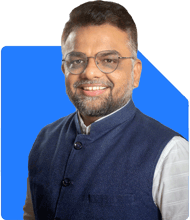
Hi , I am 50 years old having wife and 1 kid. I got laid off in March 2025 and currently running my own company since July 2025 where in I had invested Rs. 2.50 lacs. At present I am not taking any money from the company but we are not making any losses either.
I am having an Investment of
1) 30 lacs in Saving A/c and FDs.
2) 20 lacs in NSC maturing in year 2030.
3) 9 lacs in Mutual Funds.
4) 45 lacs in Equity which i intend to liquidate and put in Mutual Funds.
5) 75 lacs in PPF, PF & NPS.
6) Wife earning 50 lacs annually.
7) She has 40 lacs in Saving A/c and FDs.
8) 1.20 Cr. in PPF, PF & NPS.
9) We also own 2 properties with current fair market value of Rs. 5 Cr.
10) One property is giving us rent of Rs. 66K per month.
11) Apart from this we are also expecting to get ~ Rs. 2.50 Cr. over next 15 years for the insurance policies getting matured.
Expenses & Liabilities:
1) Monthly expenses of Rs. 4.50 lacs which includes Rent, Insurance premium, EMI against Education loan for my kid's, Medical premium, Travel, Grocery and other miscl. expenses.
2) Car loan EMI of 40,000 per month which is included in the Rs. 4.50 lacs monthly expenses. This loan is till March 2027.
3) Education loan of Rs. 1.05 Cr. with current liability of Rs. 80 lacs as we paid Rs. 25 lacs to the Bank as prepayment. We need to spend ~ Rs. 40 lacs more to support for the kid education in USA till year 2027.
4) We intend to pay the entire Education loan by max. 2030.
My question is, will this be enough for me and my wife for the retirement as my wife intends to work till 2037 if everything goes fine (when she turns 60) and I will continue running my company looking at taking Rs. 1 lacs per month from it from next FY.
Ans: You have built strong assets with discipline and patience.
Your financial journey shows clarity, courage, and long-term thinking.
Despite job loss, stability is well protected.
Your family position is better than most Indian households.
» Current life stage understanding
– You are 50 years old with working spouse.
– One child pursuing overseas education.
– You are semi-employed through your own business.
– Your wife has strong income visibility.
– This phase needs protection, not aggressive risk.
– Cash flow control matters more than returns now.
– Liquidity planning is extremely important.
– Emotional decisions must be avoided.
» Employment transition and business assessment
– Job loss was sudden but handled calmly.
– Starting your company shows confidence and skill.
– Initial investment of Rs. 2.50 lacs is reasonable.
– Zero loss position is a good sign.
– No salary draw reduces pressure on business.
– Planned Rs. 1 lac monthly draw is sensible.
– This keeps household stability intact.
– Business income should be treated as variable.
– Do not overestimate future business income.
– Use it only as a support pillar.
» Family income stability review
– Wife earning Rs. 50 lacs annually is a major strength.
– Her income anchors your retirement plan.
– Employment till 2037 gives long runway.
– Her savings discipline looks excellent.
– Large retirement corpus already exists.
– This reduces pressure on your assets.
– You should align plans jointly.
– Retirement must be treated as family goal.
» Asset allocation snapshot assessment
– You hold assets across cash, debt, equity, and retirement buckets.
– Diversification already exists.
– That shows mature planning habits.
– Savings and FDs give immediate liquidity.
– NSC gives defined maturity comfort.
– Equity exposure is meaningful.
– Retirement accounts are strong.
– Real estate is end-use, not investment.
– Rental income adds safety.
» Savings accounts and FDs analysis
– Rs. 30 lacs in savings and FDs offer flexibility.
– Wife holding Rs. 40 lacs adds cushion.
– This covers emergencies and education gaps.
– Liquidity is sufficient for next three years.
– Avoid keeping excess idle cash long-term.
– Inflation quietly erodes value.
– Use this bucket for planned withdrawals.
» NSC maturity planning
– Rs. 20 lacs maturing in 2030 is well timed.
– This aligns with education loan closure.
– This can be earmarked for debt repayment.
– Do not link this to retirement spending.
– It gives psychological comfort.
» Mutual fund exposure review
– Existing mutual fund holding is small.
– Rs. 9 lacs needs scaling gradually.
– Your plan to shift equity into funds is wise.
– This improves risk management.
– Mutual funds suit retirement phase better.
– They provide professional management.
– Avoid sudden large transfers.
– Phased movement reduces timing risk.
» Direct equity exposure evaluation
– Rs. 45 lacs in equity needs careful handling.
– Market volatility can hurt emotions.
– Concentration risk exists in direct equity.
– Monitoring requires time and skill.
– Gradual exit is sensible.
– Move funds into diversified mutual funds.
– Avoid panic selling.
– Use market strength periods for exits.
» Retirement accounts strength review
– Combined PF, PPF, and NPS is very strong.
– Your Rs. 75 lacs is meaningful.
– Wife’s Rs. 1.20 Cr is excellent.
– These assets ensure base retirement security.
– They protect longevity risk.
– Do not disturb these accounts prematurely.
– Let compounding continue.
» Real estate role clarity
– Two properties worth Rs. 5 Cr add net worth comfort.
– One property gives Rs. 66k monthly rent.
– Rental income supports expenses partially.
– This reduces portfolio withdrawal stress.
– Do not consider new property investments.
– Focus on financial assets.
» Insurance maturity inflows assessment
– Expected Rs. 2.50 Cr over 15 years is valuable.
– This gives future liquidity.
– These inflows should not be spent casually.
– They must be reinvested wisely.
– Align maturity money with retirement phase.
» Expense structure evaluation
– Monthly expense of Rs. 4.50 lacs is high.
– This includes many essential heads.
– Education, rent, insurance, travel are significant.
– EMI burden is temporary.
– Expenses will reduce after 2027.
– That improves retirement readiness.
» Car loan review
– EMI of Rs. 40,000 till March 2027 is manageable.
– This is already included in expenses.
– No action required here.
– Avoid new vehicle loans.
» Education loan strategy
– Education loan balance of Rs. 80 lacs is large.
– Overseas education requires careful funding.
– Planned additional Rs. 40 lacs till 2027 is realistic.
– Do not compromise retirement assets for education.
– Target full closure by 2030 is practical.
– Use NSC maturity and surplus income.
– Avoid using retirement accounts for repayment.
» Cash flow alignment till 2027
– Wife’s income covers majority expenses.
– Rental income adds support.
– Business draw of Rs. 1 lac helps.
– Savings bridge shortfalls.
– Cash flow mismatch risk is low.
» Retirement readiness assessment
– Combined family net worth is strong.
– Retirement corpus foundation is already built.
– Major expenses peak before 2027.
– After that, burden reduces.
– Wife working till 2037 adds security.
– This delays retirement withdrawals.
» Post-2037 retirement picture
– After wife retires, expenses will drop.
– No education costs.
– No major EMIs.
– Medical costs will rise gradually.
– Planning buffers already exist.
– Rental income continues.
» Mutual fund strategy for future
– Shift equity proceeds into diversified mutual funds.
– Use a mix of growth-oriented and balanced approaches.
– Avoid index-based investing.
– Index funds lack downside protection.
– They move fully with markets.
– No human judgement is applied.
– Actively managed funds adjust allocations.
– They protect better during volatility.
– Skilled managers add value over cycles.
» Direct funds versus regular funds clarity
– Regular funds offer guidance and discipline.
– Ongoing review is critical at this stage.
– Direct funds require self-monitoring.
– Errors can be costly near retirement.
– Behaviour management matters more than cost.
– Professional handholding reduces mistakes.
– Use mutual fund distributors with CFP credentials.
» Tax awareness on mutual funds
– Equity mutual fund LTCG above Rs. 1.25 lakh is taxed.
– Tax rate is 12.5 percent.
– Short-term equity gains face 20 percent tax.
– Debt mutual fund gains follow slab rates.
– Plan withdrawals tax efficiently.
– Do not churn unnecessarily.
» Withdrawal sequencing in retirement
– Start withdrawals from surplus funds first.
– Use rental income for regular expenses.
– Keep retirement accounts untouched initially.
– Delay withdrawals improves longevity.
– Insurance maturity inflows can fund later years.
» Medical and health planning
– Medical inflation is a major risk.
– Ensure adequate health cover.
– Review coverage every three years.
– Build separate medical contingency fund.
– Avoid dipping into equity during emergencies.
» Estate and succession clarity
– Assets are large and diverse.
– Proper nominations are critical.
– Draft a clear Will.
– Review beneficiaries periodically.
– Avoid family disputes later.
» Psychological comfort and risk control
– You are financially strong.
– Avoid fear-driven decisions.
– Avoid chasing returns.
– Stability matters more now.
– Keep plans simple and review yearly.
» Finally
– Yes, your assets are sufficient for retirement.
– Discipline must continue.
– Control expenses during transition years.
– Avoid large lifestyle upgrades.
– Focus on asset allocation, not market timing.
– Your retirement future looks secure.
Best Regards,
K. Ramalingam, MBA, CFP,
Chief Financial Planner,
www.holisticinvestment.in
https://www.youtube.com/@HolisticInvestment

























